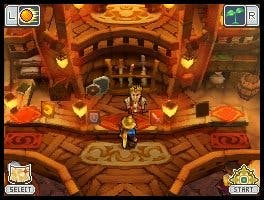Golden Sun: Dark Dawn
Everything is illuminated.
The Djinn, the stocky, ugly magical creatures which harness Psynergy to bestow status effects and to summon immensely powerful spirits, are more plentiful in number, with around 80 to collect. This obviously offers greater tactical possibilities, though most players will stick to a handful of favourites rather than diversifying too much. It's not as if there's a Pokémon-like compulsion to catch them all, as they all look similarly unattractive.
It's only once you unleash their summons in battle that their differences become more apparent. It's like choosing from a series of super-powered hamsters without being aware which one can call upon a robot that shoots laser beams from its eyes, and which can raise a giant demon that causes earthquakes.
Yet Dark Dawn's slavishness to tradition shouldn't be used as a stick to beat it with. Aside from the often lengthy dialogue sequences – text can be sped up, but it doesn't stop the camera from lazily panning across every new environment before you get the chance to explore it, nor does it affect the script's fondness for repetition – there's little here to annoy.
The brilliance of the battle system is worth reiterating. It's entirely turn-based, but random encounters are bracingly brisk and thankfully not too frequent, while boss fights are tense and tough without ever becoming attritional. Explore each area thoroughly and you shouldn't ever need to grind.
But none of those elements are why the combat stands out. It's the flexibility that impresses most; the Djinn can either be assigned to characters to change their class, or left on standby for the summons which need time to recharge after use, while even the standard Psynergy abilities offer an array of tactical possibilities that you simply don't find in most JRPGs. It means you look forward to fights rather than dreading them.

After a languid opening with some insultingly simplistic Psynergy-themed puzzles, the level design grows more interesting and the environmental teasers more fiendish. While there's little here that will have you stumped for long, there's still a degree of satisfaction in slotting all the pieces into place, and while most of the elemental favourites are present and correct (lighting torches, freezing water), a handful of riddles manage to out-Zelda the likes of Spirit Tracks and Phantom Hourglass.
And it really does look and sound great. For a world supposedly in disarray, Weyard is a surprisingly picturesque place, effervescing with colour and vitality. There's an impressive sense of scale to the environments and particularly to the enormous spirits you'll summon in battle. The score, from regular composer Motoi Sakuraba, is by turns bombastic and atmospheric, with plenty of melodic highs and a stirring reworking of the main theme.
In a year that Dragon Quest IX took a bold step forward for the JRPG, Dark Dawn can, at times, feel disappointingly retrograde. But then, it's not trying to do anything particularly different; it's simply happy to be a polished, accomplished and hugely likeable RPG with some fine puzzles and a terrific battle system.
With a lengthy central quest and plenty of side missions, there's enough Golden Sun here to illuminate many a long winter evening. It might not change the world, but those looking for something to fill their free time this Christmas might well find it rocks theirs.








